Classic Studies on Persecution in Early Christianity (7 vols.)
Digital Logos Edition
Overview
As Christianity crossed national and cultural borders and the number of Christians swelled, the religion showed its revolutionary potential and threatened Roman authority. To suppress the growing faith, Roman government persecuted Christians in brutal and often grotesque ways. Emperors Nero, Vespasian, Titus, Domitian, Trajan, Hadrian, Valerian, Decius, and Diocletian each played a part in violently opposing the fastest growing religion of their time.
The Classic Studies on Persecution in Early Christianity (7 vols.) collection examines the persecution Christians faced under each of these emperors. The texts explore the historical context from a variety of angles, highlighting the conflict between Christian teachings and Roman administration, revealing not hate for a group of people, but fear of a revolution.
With Logos Bible Software, these valuable volumes are enhanced by cutting-edge research tools. Scripture citations link directly to English translations, and important terms link to dictionaries, encyclopedias, and a wealth of other resources in your digital library. Powerful searches help you find exactly what you’re looking for. Tablet and mobile apps let you take the discussion with you. With Logos Bible Software, the most efficient and comprehensive research tools are in one place, so you get the most out of your study.

- Historical examinations of the persecution early Christians faced
- Studies of each emperor who persecuted Christians
- A variety of angles and approaches to explore the conflict
- Title: Classic Studies on Persecution in Early Christianity
- Volumes: 7
- Pages: 2,281
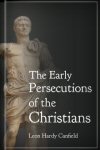
This volume presents a historical perspective of the persecution of Christians, divided into two parts. It was inspired by a seminar on “Paganism and Christianity.”
Contents
- Legal Basis of the Persecutions
- Persecution of the Christians Under Nero
- The Christians Under the Flavian Emperors
- Trajan and the Christians
- Attitude of Hadrian
- Sources on the Legal Status of the Christians
- Sources for the Neronian Persecution
- Sources for the Flavian Period
- Sources for the Period of Trajan
- Sources for the Period of Hadrian
Leon Hardy Canfield was a tutor in history at the College of the City of New York and the author of The Early Persecutions of the Christians.
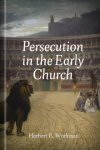
This volume takes into account the legal, historical, ecclesiastical, and experiential aspects of the early persecutions of Christians. The text emphasizes “those aspects of the inner life of the church which led to persecution.”
Contents
- The Master and His Disciples
- Caesar or Christ
- The Causes of Hatred
- The Great Persecutions
- The Experiences of the Persecuted
An interesting book on an interesting subject . . . The writer treats his subject from all the various sides . . .
—The Advance
Herbert B. Workman (1862–1951) was a Wesleyan minister and the principal of Westminster College. He was elected president of the Wesleyan Conference in 1930. He wrote numerous works, including The Letters of Jon Hus with Introductions and Explanatory Notes, Christian Thought to the Reformation, and The Evolution of the Monastic Ideal.
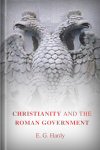
This volume is written with an emphasis on Roman history, so it focuses on the Roman perspective and avoids the sympathizing with Christians.
Contents
- The Attitude of the Republic Towards Foreign Cults
- The Treatment of Judaism
- First Appearance of Christianity in the Eastern Provinces
- Christianity in Rome Under Nero
- Christianity Under the Flavian Emperors
- Trajan and the Christians
- Persecution for the Name
- Attitude of Hadrian, Pius, and Marcus Aurelius
- Christianity in its Relation to Collegia
It is impossible for any serious reader to lay it down without the most cordial acknowledgement of its great utility and of the general clearness and consecutiveness with which the fragmentary material has been pieced together.
—W. T. Arnold, author of Studies of Roman Imperialism
Ernest George Hardy was vice principal and tutor of Jesus College at Oxford. He published numerous articles in Classical Review, Journal of Philology, and Dictionary of Greek and Roman Antiquities. He was also an editor and translator of classical Greek works.
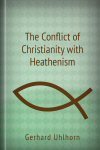
This volume was well received in Germany and quickly translated into English, Swedish, and Danish. The text was based on the best scholarship available and offers valuable insight into the struggles between early Christians and the pagans they encountered.
Contents
- The Religious Condition of the Heathen World
- The Moral Condition of the Heathen World
- The Christians
- The First Encounter
- The Christians Before the Tribunals
- The Re-Action
- The General Persecutions
- The Decisive Struggle
- The Victory
- The Last Effort of Heathenism
. . . Dr. Uhlhorn has, so to speak, isolated the subject so as to give it the completeness and exhaustiveness of detail which it deserves, and thus exhibit it in its important aspect as an argument for the divine authority and origin of the Gospel and the church. He has collected a mass of illustration of the widely divergent morality and social life of heathenism and of the primitive church such as has never before, so far as we recollect, been brought together in one volume, written so freshly and readably, and in which the demands of the scholar and of the intelligent unprofessional reader have been equally cared for.
—The Ecclesiastical Gazette
[The Conflict of Christianity with Heathenism] consequently unfolds the greatest revolution in the history of mankind. And ecclesiastical history, if such purely it can be called, has seldom been clothed in so living a style. We have not the statistical dryness of Mosheim, nor the perpetual sarcasm of Gibbon, nor the dreamy diffuseness of Neander; but great events, characters, and principles portrayed with a fresh and vigorous power. It is written with a thoroughness of scholarship to satisfy the scholar, yet with a zest of spirit and a freedom of style that suit it for the popular reader.
—The Methodist Magazine
The subject of the present work is still more attractive, and is handled in a very broad, masterly manner.
—The Library Magazine
In this review of the earliest Christian charity a picture of the church is drawn which one would not find elsewhere without searching through many volumes in many languages.
—The American Bookseller
Johann Wilhelm Gerhard Uhlhorn (1826–1901) was an Evangelical Lutheran theologian and the abbot of Loccum and Oberkonsistorialrat. His other works include Homilies and the Recognitions of Clement of Rome, Mixed Lectures on Church Life of the Past, and The Christian Charity in the Ancient Church.
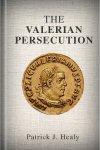
This volume examines the conflict between Christianity and Rome in light of scholarship which revealed its deep roots in state policy and administration, rather than hatred of a people. The text illuminates the magnitude of the challenges early Christians faced in spreading doctrines with the power to revolutionize Rome and the world. Healy focuses on the persecution Christians endured under Emperor Valerian.
Contents
- The Church and the Empire
- The Church and the Empire (Continued)
- Valerian
- Christianity in the First Years of Valerian’s Reign
- First Edict
- Second Edict—Persecution in Rome
- St. Cyprian and the African Martyrs
- Persecution in the West and the East
- Fall of Valerian—Edict of Gallienus
The subject is intensely interesting; the author wrote under the direction of the best masters at the Catholic University of America; his style is simple, clear, and very attractive, and his references are numerous and, we are willing to believe, accurate. Such a combination ought to produce good historical work. It has done so.
—The American Catholic Quarterly Review
Patrick J. Healy was dean faculty of theology at the Catholic University of America and is the author of The Valerian Persecution.
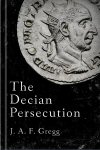
This volume follows the persecution of Christians under the rule of Emperor Decius.
The persecution lasted less than two years, but the events of this short time are nowhere recorded fully. Even the notices of the Emperor Decius himself are fragmentary. The task, therefore, which Mr. Gregg undertook was difficult; but he has executed it creditably . . . His narrative is well written, clear, and graceful . . .
—The Athenaeum
John Allen Fitzgerald Gregg (1873–1961) was a Church of Ireland clergyman, Archbishop of Armagh, theologian, and historian. His other works include The Primitive Faith and Roman Catholic Developments, Anglican Orders and the Prospects of Reunion, and The Ne Temere Decree: A Lecture.
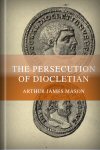
This volume emerged from a paper which received the Hulsean Essay Prize in 1874. The text elaborates on the persecution Christians faced under Diocletian, and presents several novel interpretations of the historical records of the period.
Contents
- The Second Augustus
- The Church and the Age
- Motives of the Persecution
- Diocletian’s Two Edicts of Persecution
- The Execution of the Two Edicts
- The Fourth Edict, or, the Persecution of Maximian
- From Diocletian to Constantine
. . . [Mason] has put many points in a new light; and all that he says, as far as its main substance goes, should at least be weighed before anyone decides the other way.
—Saturday Review
He has given a vivid picture of the Diocletian persecution. He has carefully studied the principal authorities, and selected from them all that is most striking and interesting . . . altogether his book is by far the best and fullest account that our language contains of this period of Christian history.
— The Athenaeum
Arthur James Mason (1851–1928) was an English clergyman, theologian, and classical scholar. He was the Lady Margaret’s Professor of Divinity and master of Pembroke College and vice-chancellor of the University of Cambridge. His other publications include Commentary on Thessalonians and First Epistle of St. Peter.
Reviews
9 ratings

Daniel Caballero
11/14/2020

Kevin Bratcher
6/12/2018

Into Grace
5/19/2015
These books are public domain. Hence, they are way over-priced. They should not cost more than $1-2 per book
M. David Johnson
3/27/2015

Denver Race
11/14/2014
AeliusCicero
6/19/2014

Larry Proffitt (I
5/29/2014
Robert Leahy
5/28/2014